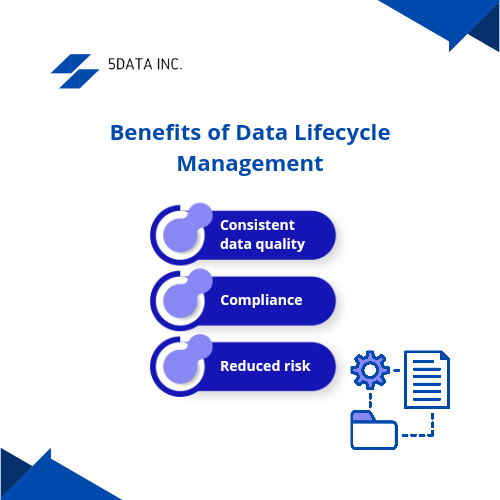What we cover in this blog
The process of managing the data flow in an information system throughout its lifecycle is known as Data Lifecycle Management(DLM).
Data Lifecycle Management: Why We Need It?
Organizations are interacting with more data than ever before. Managing this information has become a critical function for any business. Data flows in various ways throughout an organization, from one department to another or back and forth with a client. Most businesses require data management processes to keep track of these different data paths. From data collection to data storage to data archiving, these methods of classifying data ensure that the information used is the most recent and accurate version of the business’s data while maintaining its security.
Three Main Benefits of Data Lifecycle Management
Data management is complex; it requires specific goals and requirements to achieve ideal data lifecycle management. With the right data management service provider, these objectives are the foundation for a seamless and simplified data flow. An effective data management strategy can provide numerous benefits to businesses, including:
Consistent data quality
By managing data lifecycles, organizations can avoid inconsistencies and maintain data integrity in an information system’s data throughout its lifecycle.
Compliance
Organizations can guarantee compliance with industry standards and regulations by having clear policies on managing data in an active production environment.
Reduced risk
A DLM strategy aids in the reduction of risks associated with data governance, compliance, and security by enabling businesses to ensure that all of the organization’s active data are under control and managed consistently across the enterprise.
DLM provides numerous other advantages as well, including:
i) Finding data constraints such as data breaches and sensitive data.
ii) Improving information management through data creation, deletion, and data cleansing activities.
iii) Providing the ability to perform a root-cause analysis of data usage, archived data, stored data, and sensitive information lifecycle management.
iv) Providing users access to less critical data and private data and giving data protection.
v) When data is no longer in use, it is moved to different storage media, known as data archiving.

Three Important Goals of Data Lifecycle Management
Data management can be tricky for businesses at times. Through DLM, they can keep information in formats that are functional and accessible by monitoring and managing the flow of data between systems.
Forbes reports that an enormous amount of data, equivalent to 2.5 quintillion bytes, is being generated daily. Hence, data lifecycle management ensures this through underlying goals that serve as the foundation for streamlined and unhindered data flow. The three objectives of DLM are as follows:
Data security or confidentiality
With such a large volume and wide range of data usage, the risk of data misuse is always substantial. Because data is the driving force in business, organizations and individuals are concerned about its security. As a result, ensuring data security and confidentiality becomes critical.
Organizations can ensure security through lifecycle management processes, which include data maintenance best practices as one of their core capabilities to ensure strong data protection.
Fundamentally, DLM prevents unauthorized users from accessing data (such as cybercriminals). It also protects data from being corrupted or infected with malware.
For example, Government agencies and military organizations must secure sensitive information related to national security with a dedicated team of Data Management Experts to ensure smooth business operations.
Data availability or accessibility
Data is the foundation of many operations in this digital age, so it must be readily available whenever required. When data is unavailable to the right people when needed, it leads to multiple failures of processes that rely on one another to obtain data.
The availability of unstructured data is critical in data-driven services. As a result, DLM provides cloud solutions that make them available to customers and employees before they need them.
For instance, Teams and business users often need to access shared data to work together on projects and ensure that the data is available and up-to-date. Also, having a disaster recovery plan that ensures data availability is critical for organizations to maintain business operations during an outage or disaster.
Data Integrity or reliability
Multi-user computing environments are becoming more ubiquitous as data-centric technologies gain popularity. Multiple users attempting to access the same database simultaneously can result in multiple versions of the same data.
Data lifecycle management updates existing data regularly to avoid redundancy and maintain data integrity. It provides all users with clear and precise data, accelerating the agility and efficiency of business processes. DLM also eliminates information silos, which can hinder critical business collaboration.
Data Reliability is crucial in financial transactions to avoid data deletion and data destruction and to share data in a safe and secure environment.
Strengthen Your DLM Strategy with 5DataInc.
It’s time to take your business to the next level with Data Lifecycle Management (DLM). With data management, you’ll have better control over your data, prevent data silos, and ensure consistency, reliability, and accessibility across all your business systems.
The connection between digitization and data has been long-standing. With data being captured at every turn, it’s crucial to extract meaningful insights that can inform business decisions. 5DataInc team specializes in collecting, analyzing, processing, and storing data. Our analytics experts dive deeper into your data and provide valuable insights that can help you make informed decisions for your business.
Whether you’re looking to increase efficiency, improve decision-making, or simply stay ahead of the competition,5DataInc has the expertise to help you achieve your goals.

